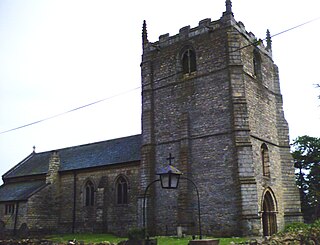
Lincolnshire is a ceremonial county in eastern England. It is bordered by the East Riding of Yorkshire across the Humber estuary to the north, the North Sea to the east, Norfolk, Cambridgeshire, Northamptonshire and Rutland to the south, and Leicestershire, Nottinghamshire and South Yorkshire to the west. The county town is Lincoln.

North Lincolnshire is a unitary authority area with borough status in Lincolnshire, England. At the 2011 Census, it had a population of 167,446. The administrative centre and largest settlement is Scunthorpe, and the borough also includes the towns of Brigg, Broughton, Haxey, Crowle, Epworth, Bottesford, Kirton in Lindsey and Barton-upon-Humber. North Lincolnshire is part of the Yorkshire and the Humber region.

Scunthorpe is an industrial town in the North Lincolnshire district, in the ceremonial county of Lincolnshire, England. It is Lincolnshire's third most populous settlement, after Lincoln and Grimsby, with a population of 81,286 in 2021. Scunthorpe is the United Kingdom's largest steel processing centre.

Bottesford is a town in North Lincolnshire, Lincolnshire, England.

Kirton in Lindsey, also abbreviated to Kirton Lindsey, is a market town and civil parish in North Lincolnshire, England. It is 7 miles (11 km) south-east from Scunthorpe.

Grayingham is a village and civil parish in the West Lindsey district of Lincolnshire, England. The population of the civil parish at the 2011 census was 123 It is situated 1 mile (1.6 km) south from Kirton in Lindsey, 8 miles (13 km) north-east from Gainsborough and 8 miles south from Scunthorpe.
Royal Air Force Kirton in Lindsey or more simply RAF Kirton in Lindsey is a former Royal Air Force station located 15 miles (24 km) north of Lincoln, Lincolnshire, England.

Scotter is a large village and civil parish in West Lindsey, Lincolnshire, England, situated between Scunthorpe and Gainsborough.

West Halton is a village and civil parish in North Lincolnshire, England. It is situated 2.5 miles (4 km) north-west from Winterton, approximately 7 miles (11 km) north from Scunthorpe, and 2 miles (3 km) south from the Humber Estuary. The parish contains part of Coleby, a hamlet south of the village.

Saxby All Saints is a village and civil parish in North Lincolnshire, England. The population of the civil parish at the 2011 census was 385. It is 6 miles (9.7 km) north of Brigg and 4 miles (6.4 km) south-west of Barton upon Humber.
Huntcliff School is a mixed secondary school located in Kirton in Lindsey, North Lincolnshire, England.

Louth Town Hall is a municipal building in Eastgate in Louth, Lincolnshire, England. The structure, which was the meeting place of Louth Borough Council, is a Grade II listed building.

Garstang Town Hall is a municipal building in the High Street in Garstang, Lancashire, England. The structure, which currently accommodates two shops and a Royal British Legion Club, is a Grade II listed building.

Ashby-de-la-Zouch Town Hall is a municipal building in Market Street in Ashby-de-la-Zouch, Leicestershire, England. The structure, which was used as the offices of Ashby-de-la-Zouch Urban District Council, is a Grade II listed building. The market hall, which is located behind the town hall, is separately listed.

The Buttercross, also known as Brigg Town Hall, is a municipal building in the Market Place in Brigg, Lincolnshire, England. The structure, which is used as a tourist information centre and as an events venue, is a Grade II listed building.

Kirton in Holland Town Hall is a municipal building in Station Road in Kirton, Lincolnshire, England. The structure is currently used as a community events venue and as the meeting place of Kirton Parish Council.

Stokesley Town Hall is a municipal building in the Market Place in Stokesley, North Yorkshire, England. The structure, which accommodates the offices and meeting place of Stokesley Town Council, is a grade II listed building.

Corbridge Town Hall is a municipal building in Princes Street in Corbridge, Northumberland, England. The building, which is now in commercial use, is a Grade II listed building.

The Old Town Hall is a former municipal building in the High Street in Wrentham, Suffolk, England. The building, which was the meeting place of Wrentham Parish Council, is a Grade II listed building.

The Old Town Hall is a municipal building in the High Street in Spilsby, Lincolnshire, England. The structure, which accommodates some shops and a petrol filling station, is a Grade II listed building.



















